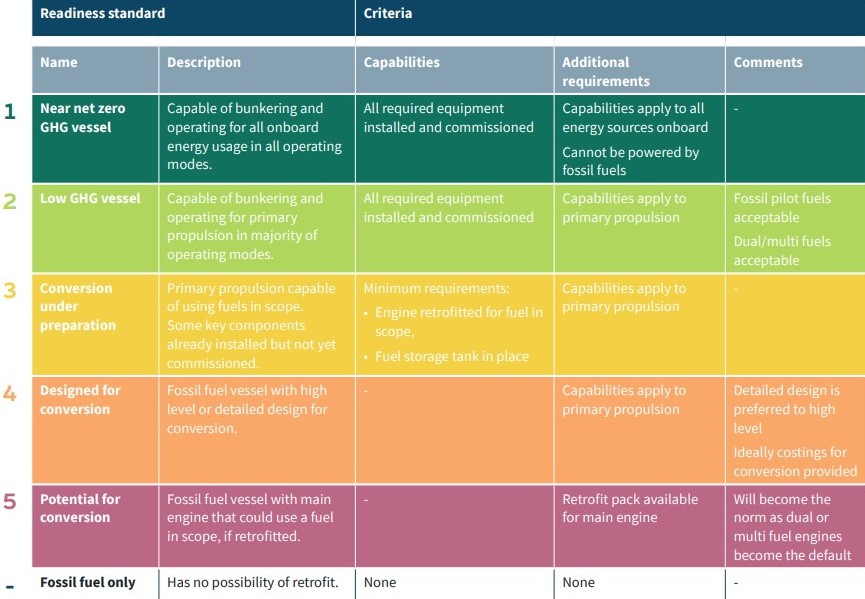Lloyd’s Register (LR) has launched a five-level framework, called “Zero Ready Framework – helping to ensure shipping can deliver our zero-emissions future,” for assessing the actual readiness of a vessel for the transition to zero carbon fuels.
The framework ranks vessel readiness for zero carbon fuel operations from 1 (highest level of readiness) to 5 (lowest level of readiness), and measured on a well-to-wake basis.
It has been created to offer clarity around the term “readiness” which is used in multiple ways across the shipping industry. The rankings were developed based on observations that some shipowners have had a design for conversion to zero carbon fuel done as a paper exercise, without a plan for how the conversion would be carried out.
Others have some or all the required equipment already installed. Another group of vessels have a dual fuel engine that could run on a zero-carbon fuel but may require an engine retrofit to do so.
As ships built today will still be in service in the 2040s, it’s essential for shipowners to understand the full implications of actual vessel ‘readiness’ for zero carbon fuels to meet the industry’s 2050 decarbonisation targets
Charles Haskell, Director, LR Maritime Decarbonisation Hub, said.

5 levels of readiness
Level 1) The long-term goal is near net zero GHG vessels: Ultimately, 2050, all vessels in service need to all intents and purposes, be near net zero. This means capable of bunkering and operating with fuel with lifecycle emissions of net zero for all energy sources (be these propulsion or otherwise) and in all modes of vessel operation.
We call these ‘near net zero’ to allow for the reality that even fuels without a carbon molecule may involve a small unavoidable release of some GHGs somewhere in the end-to-end supply chain. Such vessels, which cannot be powered by fossil fuels, are categorised as level 1
As of today, very few vessels in service meet these level 1 requirements and those that do are short sea ships such as passenger ferries. Level 1 defines the aspiration for ocean going shipping and we expect businesses to publish strategies and plans showing how they intend to reach level 1.
Level 2) At present we are able to build low GHG vessels: For ocean going shipping, today’s focus is on low GHG Vessels, categorised as level 2. These are ships that are capable of bunkering and operating today for primary propulsion in a majority of operating modes, often dual fuelled.
They may use fossil pilot fuels or operate mainly using fossil fuels where zero carbon fuels are not yet available.
At present most of the level 2 ships in service are methanol capable, typically dual fuelled with a 2-stroke diesel engine. A majority are either tankers or containerships. There is also a healthy methanol capable orderbook.
Level 3) Vessels with conversion under preparation are a strong signal of intent by the industry: The framework describes vessels that cannot use zero carbon fuels today but have some of the components needed in place already, as conversion under preparation, categorised as level 3.
This shows that the asset has advanced beyond the design stage and work is underway to make the vessel capable of propulsion with zero carbon fuel, albeit recognising there will be further conversion costs later.
This category attempts to de-risk the asset and maximise optionality by balancing upfront investment against downstream investment.
An analysis of preparing container vessels for conversion to alternative fuels7 by The Mærsk Mc-Kinney Møller Centre for Zero Cabon Shipping expands upon Level 3, going beyond the engine and tank, detailing additional factors such as:
- Allocation of space for new equipment;
- Putting key structural elements in place to support new equipment;
- Installing piping, cabling and ventilation.
Level 4) A design for conversion is the foundation of vessel readiness: Many vessels that are described as ‘ready’ are just at the design stage. For example, a fossil fuel vessel, existing or newbuild, has been subject to a design study showing how it could be converted to a zerocarbon fuel in the future.
This may be a high-level conceptual design with general arrangement drawing showing how the layout would change. Or it may be a detailed design with complete equipment specification, identified components and detailed design drawings.
There may have been an Approval in Principle (AIP) for the design provided by a classification society. Either way there is much to be done to make the vessel ready and usually the investment case is unquantified.
In addition, design drawings often become out of date once a vessel has been in service for few years, as equipment is changed, and repairs and modifications are made. We categorise this as level 4, design for conversion.
Experience in shipping and other industries tells us how important it is to design safety in as early as possible.
The costs of adding safety in when converting an existing vessel are much higher than when newbuilding. And the level of safety achievable may well be lower.
From a safety perspective the design stage is critical
the report highlights.
Level 5) Dual fuel engines are becoming the default for newbuilding: Marine engine manufacturers are increasingly developing and offering engines of a modular design, that can be retrofitted to run on a different fuel simply by replacing or adding certain parts.
The manufacturer typically offers these parts as a retrofit pack which can be purchased at a later date. This removes a barrier to later conversion in that there is no need for a complete engine replacement.
However, in reality this represents a very low level of readiness as major investment is still required and all of the factors described above also need to have been addressed.
We categorise this level of readiness as level 5, potential for conversion
LR concluded.






























































